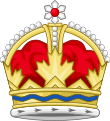Liberalism in Canada
| Part of a series on |
| Liberalism |
|---|
 |
 |
|---|
Liberalism (French: Libéralisme) has been a major trend in Canadian politics since the late 18th century. Canada has the same features of other liberal democracies in the Western democratic political tradition. This article gives an overview of liberalism in Canada. It includes a brief history of liberal parties with substantial representation in parliament.
Liberal parties[edit]
Liberal parties developed in both the French and English speaking parts of Canada; these developments led to the formation of the Liberal Party of Canada. Liberal parties exist on a provincial level; however, while they mostly share similar ideologies, not all provincial parties are officially affiliated with the federal party.
In Canada, a "capital-L" liberal refers to the policies and ideas of the Liberal Party of Canada/Parti Libéral du Canada (member LI), the most frequent governing party of Canada for the last century and one of the largest liberal parties around the world. The Quebec Liberal Party (Parti libéral du Québec) combines liberalism with more conservative ideas. Only federal parties are included in the following timeline. For inclusion in this scheme, it is not necessary for parties to have explicitly labelled themselves as a liberal party.
Timeline of the federal Liberal Party[edit]
Canadian Party / Patriot Party / Red Party[edit]
- 1806: Liberals in the Francophone part of Canada formed the Canadian Party (Parti Canadien)
- 1826: The party is renamed Patriot Party (Parti Patriote) and is led by Louis-Joseph Papineau
- 1848: The party is further reorganised into the Red Party (Parti rouge)
- 1867: The PR merged into the present-day Liberal Party of Canada
Reform Party[edit]
- 1841: The Upper Canada Reform Party is formed
- 1855: Radical members formed the Clear Grits.
- 1867: The Reform Party merged into Liberal Party of Canada
Clear Grits / Liberal Party of Canada[edit]
- 1855: Radical members of the Reform Party formed the Clear Grits
- 1867: The Clear Grits merged with the Reform Party, the Red Party and provincial liberal parties into the present-day Liberal Party of Canada
Current parties[edit]
In addition to the federal party, each province and the Yukon territory has its own Liberal Party; however, those in British Columbia, Alberta, Saskatchewan, Manitoba, Ontario and Quebec are no longer affiliated with the federal party. The British Columbia Liberal Party is notably centre-right and often described as a "free enterprise coalition", with supporters from both the federal Liberal and Conservative parties.[1] Under their system of consensus government, political parties are not recognized in the territories of Nunavut and Northwest Territories.
Liberal leaders[edit]
Parti Patriote[edit]
Clear Grits[edit]
Parti Rouge[edit]
Liberal Party of Canada[edit]
- Alexander Mackenzie
- Edward Blake
- Wilfrid Laurier
- Daniel Duncan McKenzie
- William Lyon Mackenzie King
- Louis St. Laurent
- Lester Bowles Pearson
- Pierre Elliott Trudeau
- John Turner
- Jean Chrétien
- Paul Martin
- Bill Graham
- Stéphane Dion
- Michael Ignatieff
- Bob Rae
- Justin Trudeau
Liberal thinkers[edit]
- Mario Bunge - Argentinian-Canadian professor of philosophy.
- Michael Ignatieff - political philosopher and former leader of the federal Liberal Party.
- Will Kymlicka - Canadian liberal thinker included in Contributions to liberal theory
- Jan Narveson - Canadian political philosopher and defender of libertarianism, or classical liberalism, currently Emeritus Professor of Philosophy, University of Waterloo
References[edit]
- ^ McElroy, Justin (May 6, 2017). "Why the B.C. Liberals are sometimes liberal and sometimes not". CBC News. Retrieved August 13, 2019.


 French
French Deutsch
Deutsch